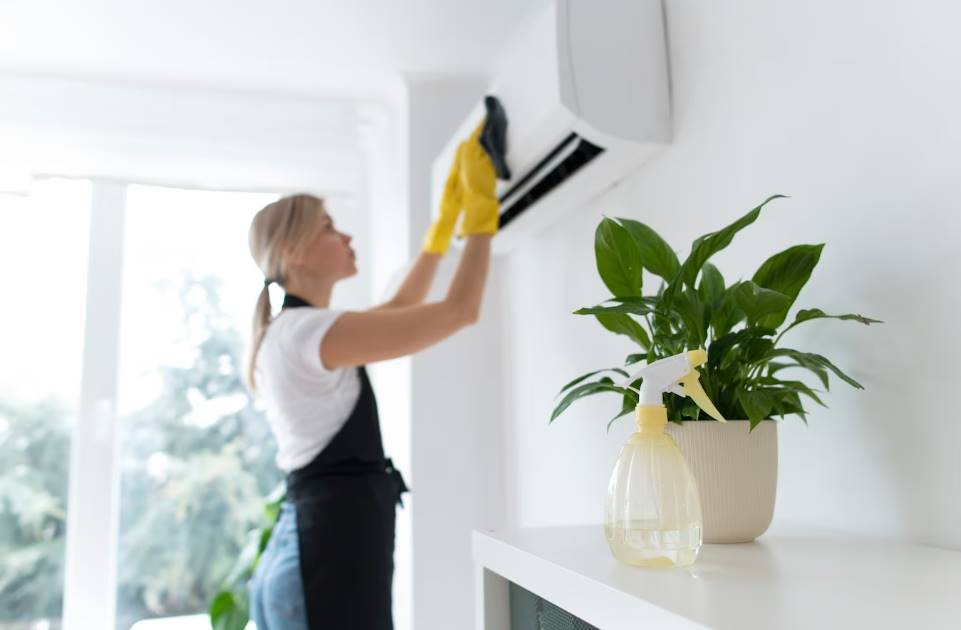The majority of individuals would describe summer as hot and humid. Those of you who are fortunate enough to own an air conditioner may spend much of the day with it cranking. But while the air conditioner is on, do you ever question how humid the house is? Just because the temperature inside is comfortable doesn't mean the humidity level is low. We'll learn all about humidity and how it affects the efficiency of your air conditioner in this article.
An Overview of Humidity
Humidity is the measure of how much water vapour is in the atmosphere. Everybody has felt the oppressive weight of the humid summer air. Humidity levels are so high right now. Conversely, low humidity, as experienced on chilly winter days, can make the air feel dry and crisp. What does this have to do with your AC, then?
In the summer, a home with too much humidity can feel even hotter than it is. However, few know that the air conditioner can also be harmed by excessive humidity in the room.
The effectiveness of the air conditioner suffers when the relative humidity within the house is too high. This article discusses indoor humidity control in certain conditions.
Absolute vs. Relative Humidity
RH measures air moisture and how much it would be if air were saturated at a given temperature. The rate of RH changes as the temperature changes with the indoor air. You and your loved ones can relax this summer knowing that humidity control is available.
Absolute humidity, which we perceive when we go outside, is the quantity of moisture. The water vapour in the air is measured as "absolute humidity," independent of the ambient temperature.
When the vapour pressure of one area is higher than that of another, moisture will naturally migrate to the lower-pressure area. Moisture increases with increasing temperature in dry climates, while the opposite is true in colder climates. Porous materials or passageways allow hot, humid air to enter the air conditioning system.
A house can be invaded by water vapour from:
- Problems with the basement's structure or the plumbing
- Fractures in the home's walls and floors might be detected everywhere, from the basement to the foundation.
- Leaky windows, among other things.
- This water can do extensive damage to your home if it is not drained and removed.
Some examples of mechanisms through which this water is taken up and carried are:
- Water that pools around a house might cause leaks.
- Absorption of liquid water by building materials, wood, hardwood flooring, and furniture.
- Molecules of water vapour seeping through cracks in a structure
- Because of the pressure gradients, air molecules carried water vapour through porous materials.
Air Quality and Humidity
Did you know that the humidity in your home might affect the safety of the air you breathe? Dry skin, itchy eyes, and trouble breathing are all symptoms of too-dry air. In contrast, high humidity levels can promote the growth of allergenic moulds and dust mites, aggravating existing respiratory and allergy problems.
Your Comfort and Humidity
Other factors besides the thermostat's temperature setting contribute to your comfort level at home. The humidity level is quite important. If the humidity is high enough, the air temperature may feel higher than it is. However, low humidity can trick your body into thinking it's cooler than it is. Finding that a happy medium is essential for a relaxed state of mind.
On humid days, your body needs to work more to control its temperature, making it more prone to heatstroke. Our sweat takes longer to evaporate at high humidity since there is already so much water vapour in the air. Because of this, you may experience breathing difficulties and profuse sweating. To mitigate these outcomes, drinking enough water and taking frequent breaks from the sun is important.
Controlling Humidity with Air Conditioning
Air conditioners provide a wide range of additional functions. They remove the moisture as well. Humidity is reduced when warm, humid air travels over the evaporator coils of an air conditioner, and the moisture therein condenses into water droplets. This does double duty by cooling the air and improving the comfort level.
Air conditioning can reduce the temperature in your home, but it does nothing about the humidity. The thermostat regulates the room's temperature, not the humidity. Therefore, the thermostat instructs the air conditioner to turn on when the temperature reaches a specified threshold. So, you can set the thermostat to 72 degrees Fahrenheit and still feel sticky due to the excessive humidity outside.
Ideal Relative Humidity for Your House
There is a good chance that half of the dirt, mildew, and dust in your home is coming from the basement or crawl area. Mould growth and structural deterioration are two side effects of high humidity. Mould grows rapidly when the outside air is warm and moist and combines with cooler surfaces indoors.
Humidity levels of 30–60% are considered optimal for a comfortable interior environment. Indicators of excessive moisture in the air at home include:
You may measure your home's relative humidity with a hygrometer at most hardware stores.
Ensure there is no condensation on the windows and no moisture or mould on the walls or ceilings.
High external humidity combined with air leakage from cracked or open windows and doors can cause uncomfortable amounts of moisture within the house. Cooking, showering, and drying clothes indoors are all activities that add moisture to the air and can increase the humidity level in a home.
High-Humidity Effects
Mould and mildew are not welcome visitors, and they can be brought into your home by excessive humidity. It can also cause unpleasant stickiness and heat. It can also increase energy costs because your air conditioner must work more to keep your home comfortable.
Unlike newer models, air conditioners from the past do not include dehumidifiers.
On days with high humidity, the air conditioner may not cool the rooms well. The air conditioner will have to work harder to achieve the desired indoor temperature when the humidity levels are high. It will cause the air conditioning to break down prematurely due to inconsistent cooling and increased wear and tear.
Because moisture in the air makes it warmer, it reduces the effectiveness of air conditioners. To produce cool air, the air conditioner will have to work hard. The cooling system will be put under extra stress due to this. Algae and mould in ducts can lower interior air quality and cause allergy reactions if humidity is high.
Dehumidifiers are Here to Save the Day When It Comes to Humidity Control
If you live in a humid region, you may want to invest in a dehumidifier. These gadgets collaborate with your air conditioner to keep your home at a comfortable humidity level. They're especially helpful for preventing mould and other discomforts caused by high humidity.
Putting a dehumidifier in your basement or other low-lying areas is a great way to solve this issue. The relative humidity (RH) in your home can be maintained with the help of a dehumidifier, which is designed to do just that. By installing one, you can prevent mould growth and get rid of musty odours.
A dehumidifier should be installed to save your air conditioning unit from damage if high humidity persists throughout the summer.
Here are a few telltale indicators that your home could use a humidifier:
Levels of Relaxation Increased
The obvious benefit of dehumidification is increased comfort because of the resulting decrease in humidity. If you install a dehumidifier, you won't need to turn the air conditioner to freezing temperatures to be comfortable. As soon as you breathe in the lighter air, your body will respond by feeling less clammy, sweaty, and tired.
A Healthy Home
Dehumidification is often used to maintain a healthy environment for the whole family. It improves everyone's breathing conditions. Dust mites, mould, and mildew, all common allergens, flourish in high humidity. High humidity can have a devastating effect on the symptoms of allergies and asthma.
An Improved Indoor 'Smell'
When moisture, mould, and mildew are absent from a space, it takes on a pleasant aroma. The "musty" stench that develops when mould and mildew thrive is greatly diminished by using a dehumidifier.
Safe Garments & Fabrics
Mould growth on textiles, including clothing, upholstery, blankets, bath towels, and curtains, is exacerbated by high indoor humidity or moisture levels. Installing a dehumidifier fixes this.
Protected Property
If you install a dehumidifier in your home, your gadgets, tools, and computers will be safe from rust and corrosion.
It's a new, improved beginning.
Clothes will dry quicker, and perishables like bread and cereal will last longer if humidity levels in the home are reduced.
Less Time Spent Cleaning
Home dust levels can be lowered by using a dehumidifier. If there is less dust, there will be fewer messes to clean.
Lowered Energy Prices
Because dehumidification makes your air conditioner more efficient, it reduces your monthly energy bills. You should decrease the thermostat to feel more comfortable in a home with high humidity. You may save money on energy and keep the house at a more comfortable temperature by using the dehumidification option. As a result, this can have a positive impact on energy efficiency by reducing the need for the air conditioner to run as often.
Each of us has felt like saying that at some point. It has affected all of us. Consider how useful a dehumidifier could be for you and your family while shopping for a new air conditioner. Personal comfort, freshness, and the energy savings you might experience from a smoother-functioning air conditioning unit are all factors that can help you make a decision, as is a history of allergies, asthma, or other respiratory diseases.
Comfort and health are directly impacted by the humidity level in your home's air conditioning system. If you take the time to learn about and control the humidity in your house, you can keep your family safe, comfortable, and healthy.
Conclusion
When it comes to air conditioning, humidity is a major factor in how well the system works. A high relative humidity can increase the perceived temperature and degrade the quality of the air around you. As the indoor air temperature shifts, so does the relative humidity. The amount of moisture in the air, expressed as a percentage, that does not rely on the temperature outside. In arid regions, moisture levels rise as the temperature rises, but in colder regions, the inverse is true. Hot, muggy air can seep into an HVAC system through porous materials or openings.
Dry skin, itchy eyes, and difficulty breathing are all signs that the air you're breathing may not be safe. Moulds and dust mites, both of which can aggravate respiratory and allergy conditions, thrive in damp environments.
Air conditioners' ancillary duties include the condensation of moisture into water droplets for easy removal. A/C, however, can only help with the temperature within the house. The thermostat only controls the temperature in the room. Even if you turn the heat up to 72 degrees Fahrenheit, the sticky air may not go away if the humidity is high.
Mould growth, structural decay, and higher energy bills are all results of excessive humidity in the home. The ideal relative humidity range for a home or building is between 30 and 60 percent. Indoor activities like cooking, showering, and drying clothes can increase the amount of moisture in the air, which can be measured using a hygrometer.
When humidity levels are too high, it can get sticky, hot, and expensive to run the air conditioner. To avoid mould and other discomforts associated with high humidity, dehumidifiers should be used regularly. Placing a dehumidifier in a damp basement or crawl space may keep the air dry and comfortable.
Relaxation, health, indoor air quality, protection against rust and corrosion, and cleaning time are all enhanced by a properly functioning dehumidifier. In addition to making the air conditioner more cost-effective, dehumidification can have a positive impact on monthly energy costs.
If you or a family member suffers from allergies, asthma, or another respiratory issue, you may want to take those factors into account when searching for a new air conditioner. To keep your family safe, comfortable, and healthy, it's important to be aware of and manage the humidity levels in your house.
Content Summary
- Humidity is the percentage of atmospheric water vapour.
- In the summer, high indoor humidity can make an already hot house intolerable.
- Humidity levels that are too high might also cause problems for air conditioners.
- When the temperature shifts, so does the relative humidity (RH).
- Absolute humidity is a measurement of the amount of moisture in the air and is unaffected by temperature.
- Basements and leaks are just two common entry points for water vapour into residential spaces.
- Breathing problems can be exacerbated by poor indoor air quality due to high humidity.
- Comfort levels in the home are affected by the relative humidity.
- When humidity levels are high, the body has to exert more effort to maintain a comfortable temperature.
- Air conditioners dehumidify and chill the air, making the space more pleasant to spend time in.
- Temperature and not humidity is regulated by thermostats.
- Humidity levels between 30 and 60 percent are recommended inside.
- Mould growth and structural problems can be caused by excessive humidity.
- Humidity over acceptable levels can cause problems for both AC equipment and the wallet.
- Dehumidifiers are useful for reducing humidity and making a space more pleasant to spend time in.
- Dehumidifiers are useful for avoiding mould and musty odours.
- Dehumidification improves living conditions and lessens the need for extremely low air conditioning settings.
- By decreasing allergies, dehumidification improves indoor air quality.
- Musty odours from mould and mildew can be eliminated with the help of a dehumidifier.
- Mould and mildew can easily grow on garments if the humidity is too high.
- Rust and corrosion can be avoided on property with the help of dehumidification.
- Clothes dry more quickly and perishables last longer when humidity levels are lower.
- With a dehumidifier installed, there will be less dust in the home and hence less cleaning.
- Reducing relative humidity improves air conditioning performance and saves money.
- Humidity regulation is critical for health, safety, and cost and energy efficiency.
- When searching for a new air conditioner, don't forget to look into dehumidifiers.
- Factors such as freshness, personal comfort, and energy efficiency are crucial.
- Humidity can have an effect on allergies, asthma, and other respiratory illnesses.
- Humidity levels inside have a direct effect on comfort and wellbeing.
- Humidity control is an important part of home safety and health.
Frequently Asked Questions About Air Conditioner
The ideal indoor humidity level typically ranges from 30% to 60%. This range provides a comfortable environment and helps prevent mould growth and excessive dryness.
High humidity can make your home feel warmer than it is because your body struggles to cool down through sweating. This makes your AC work harder, increasing energy consumption and wear on the unit.
No, air conditioners primarily regulate temperature, not humidity. While they remove some moisture as they cool the air, they might not be sufficient for effective humidity control, especially in humid conditions.
Dehumidifiers are designed to control humidity levels precisely. They work alongside your air conditioner to remove excess moisture from the air, ensuring a comfortable and healthier indoor environment.
Yes, high humidity can contribute to health issues such as respiratory problems, allergies, and worsened asthma symptoms. It can also promote the growth of allergenic moulds and dust mites, further affecting your health and comfort.



